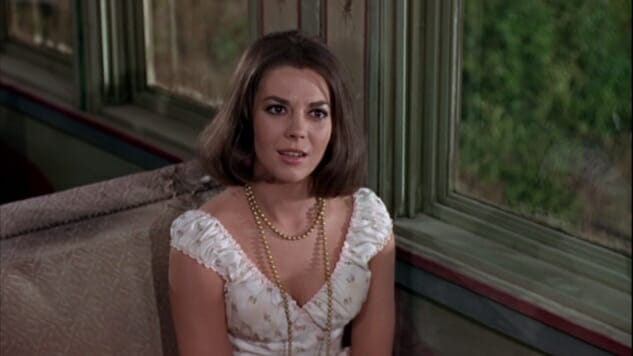
Can you be a genius at something through sheer force of will? If that’s a thing, Natalie Wood might have been an especially amazing example of it.
I mean, there was probably only ever one way it was going to go: by all accounts, Wood had the mother of all stage mothers, a Russian immigrant with big and creepily specific dreams for her child. She took Natalie to the cinema from infancy, telling her over and over that she was destined for the limelight before she even had all of her teeth, much less an independent identity or dreams of her own.
Sure enough, when a film crew showed up in Santa Rosa to shoot Happy Land, Maria Gurdin made sure her four-year-old was there haunting the set. It worked. Natalie won the heart of the director and scored a bit part. That was all it took for her mother to relocate to Los Angeles. For her four-year-old’s career. Anecdotes frequently told about Wood would largely make a family therapist need smelling salts—my personal favorite is an oft-recounted one where Maria tore the wings off a live butterfly to get her daughter to cry on cue. Luckily (I suppose), Hollywood agreed with Maria that her daughter had serious star power. By the time she scored a career-making part in Miracle on 34th Street, she was already a veteran actress with dyed-blonde hair and a digestible stage name. (Natalia Nicolaievna Zakharenko was a bridge too far for Los Angeles.) Her career did slow down once or twice between then and her untimely and mysterious death, but the woman ultimately dubbed “our sexual conscience” made 56 films, working with some of the most important directors of the day, and often dwelling in a psychological landscape dominated by parent-child power politics, something she had a unique gift for communicating.
People refer to Natalie Wood as a “child star,” but I think even as a child she earned a much less dismissive epithet. She was a gifted actor, even before she could read her own lines. She seemed born for the screen (and that was almost literally the case), presumably taking cues from her relationship with a domineering, abusive mother and translating them to be agreeable to directors. She grew up in public, eventually chafing at little-girl typecasting and reaching out for roles that let her rebel against the oppressive weight of family or societal norms. One of the crappy things about toxic relationships is that as much as we want to say they should not ever happen, that we should be protected from having to experience them—the truth is they can drive us to reach beyond ourselves and endow us with the insight and empathy we need to slip into the skin of a character in a similar kind of pain. Nicholas Ray screen tested over 30 actresses to play world-weary Judy in Rebel Without a Cause and concluded Wood was the only one who really “got” the role. (He road-tested her as a paramour for good measure.) I’m sure Wood wasn’t the only teenager in Hollywood living in a painful parental pressure cooker and dealing with impossible demands, but she was certainly a large-looming exemplar of an adolescent girl ready to crack under the weight of intense scrutiny and ever-escalating demands. Elia Kazan leveraged the same teen-individuation tensions in the sultry, high-voltage Splendor in the Grass—you couldn’t watch a single scene without feeling like you were watching some kind of gorgeous caged bird desperate to flee to freedom. West Side Story did it again; her Maria was pitch perfect even though Marni Nixon did the actual singing. Wood’s vocals might not have been compelling enough, but on the winsome, restless, innocent-sexy, pining-for-freedom vibe front, Natalie Wood was peerless. Perhaps the apotheosis of Wood’s career-long omnibus on toxic mothers was Gypsy, in which she played stripper Gypsy Rose Lee opposite Rosalind Russell, whose terrifying turn as a next-level stage mother probably rivalled Wood’s real-life mom. Here, the point isn’t a love story between a man and a woman—it boils down to the agony of enmeshment with a primary caregiver who bends over backward for you so constantly and dramatically that you can’t quite figure out why you feel worthless and pinioned.
Natalie Wood turned desperation into a superpower. Pause on nearly any closeup of her, at nearly any age, and you can see those big eyes brimming over with it, fathomless and dark as the open water that had terrified her since childhood (and which ultimately claimed her at age 43). Desperation was a big part of what worked for her as an actor—we’ve probably always recognized our own pain, our own desire to escape, when we looked at her.
She never named the high-profile older man who sexually assaulted her at the Chateau Marmont when she was sixteen. Her mother wouldn’t hear of it.